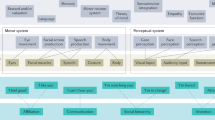Abstract
The importance of face-to-face informal communication is well recognized. The ‘irori’ is a Japanese-traditional little sitting space or room with a fire burning which affords relaxation and intimacy among a family. We, adopting the ‘irori’ as a metaphor, have designed and developed a cyber-space called IRORI as an IT-based space that catalyzes face-to-face informal communication among members of a small organization. We conducted evaluations of the IRORI by user experiments. The results of the experiments suggested that the IRORI brought about relaxation and conversation catalysis.
Preview
Unable to display preview. Download preview PDF.
Similar content being viewed by others
References
Isaacs, E., Tang, J., Morris, T.: Piazza: A desktop interactions. In: Proc. CSCS 1996, Boston MA, November 1996, pp. 315–324. ACM Press, New York (1996)
Kraut, R., Egido, C., Galegher, J.: Patterns of contact and communication in scientific research collaboration. In: Galegher, J., Kraut, R. (eds.) Intellectual teamwork: Social and technological foundations of group work, pp. 149–171. Laurence Erlbaum Assoc. Mahwah (1990)
Nonaka, I., Konno, N.: The Concept of ‘Ba’: Building a Foundation for Knowledge Creation. California Management Review 40(3), 40–54 (1998)
Tang, J., Ruaa, M.: Montage: Providing Teleproximity for Distributed Groups. In: Proc. CHI 1994, pp. 34–37. ACM, Boston (1994)
Obata, A., Sasaki, K.: OfficeWalker: A Virtual Visiting System Based on Proxemics. In: Proc. ACM 1998 Conference on Computer Supported Cooperative Work, Seattle, pp. 1–10 (1998)
Dourish, P., Bly, S.: Portholes: Supporting Awareness in Distributed Work Group. In: Proc. CHI 1992, pp. 541–547. ACM, New York (1992)
Matsubara, T., Sugiyama, K., Nishimoto, K.: Raison d’etre object: A cyber-hearth that catalyzes face-to-face informal communication, Springer LNCS 2480. In: Han, Y., Tai, S., Wikarski, D. (eds.) EDCIS 2002. LNCS, vol. 2480, pp. 537–546. Springer, Heidelberg (2002)
Hall, E.T.: The Hidden Dimension, Doubleday, New York (1966)
Nishide, K.: Distance Between a Human and a Human. Architect and Business, (in Japanese) 5, 95–99 (1985)
Author information
Authors and Affiliations
Editor information
Editors and Affiliations
Rights and permissions
Copyright information
© 2004 Springer-Verlag Berlin Heidelberg
About this paper
Cite this paper
Usuki, M., Sugiyama, K., Nishimoto, K., Matsubara, T. (2004). Evaluation of the IRORI: A Cyber-Space that Catalyzes Face-to-Face Informal Communication. In: Negoita, M.G., Howlett, R.J., Jain, L.C. (eds) Knowledge-Based Intelligent Information and Engineering Systems. KES 2004. Lecture Notes in Computer Science(), vol 3213. Springer, Berlin, Heidelberg. https://doi.org/10.1007/978-3-540-30132-5_46
Download citation
DOI: https://doi.org/10.1007/978-3-540-30132-5_46
Publisher Name: Springer, Berlin, Heidelberg
Print ISBN: 978-3-540-23318-3
Online ISBN: 978-3-540-30132-5
eBook Packages: Springer Book Archive




